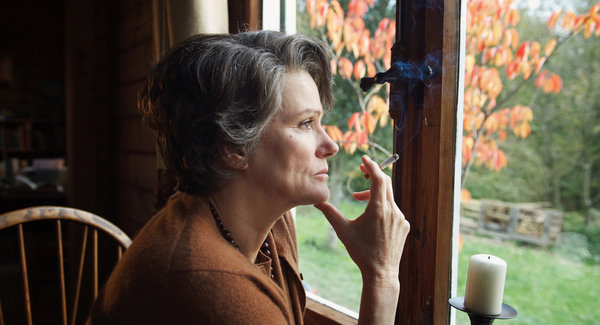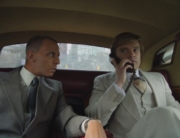Hannah Arendt humanizes an intellectual whose persona is usually remembered as grim as her philosophical observations of 20th century totalitarianism. Writer/director Margarethe von Trotta reveals the woman behind the work at a point when her public writings became entangled with her personal life. In 1960, Arendt (forcefully portrayed by Barbara Sukowa) is a middle-aged matron wearing ever-present pearls, living comfortably in a book- and modern art-filled New York apartment with her loving husband of 20 years, Heinrich Blücher (Axel Milberg), hosting soirees of fellow German émigré academics, and sharing girlish confidences with her earthy best friend, writer Mary McCarthy (Janet McTeer).
When the news breaks that Israel has abducted from Argentina Adolf Eichmann, the administrator of the Nazis’ Jewish Affairs Department, and will try him in their court, Arendt convinces The New Yorker editor William Shawn (Nicolas Woodeson) to send her to cover the trial. He’ll ruefully realize he’s not dealing with the usual deadline-bound journalist, and her observations and insights will be quite unlike the other 600 reporters from around the world she joins chain-smoking in the huge press center. She intently watches in the court room and on the closed-circuit TV feed (actual black-and-white clips), and observes Eichmann’s smirking reactions and self-serving testimony. (More footage can be seen in Michael Prazan’s recent documentary The Trial of Adolf Eichmann. Ironically, Israelis did not yet have TV, so the country was glued to the radio.)
Reuniting with an old Zionist friend, Kurt Blumenfeld (Michael Degen), and walking the streets of the modern Jewish state, past armed soldiers and Hassids, she hones in on how Eichmann answered questions about his conscience: “I support the state.” Back in New York, she pours over the thousands of pages of transcripts from the year-long trial, and over the next year thinks through her reactions with her surprised coterie: “He’s not scary. He’s a nobody. He’s terrifyingly normal. It was just the law.” As she wrestles with the concept of evil, she dismisses characterizations of him as a monster within their German literary touchstones: “Eichmann is no Mephisto.”
The film usefully spotlights the personal fallout when her five-part magazine series was published in 1963, and then compiled in book form, with some revisions, as Eichmann in Jerusalem: A Report on the Banality of Evil, a striking contrast to the first-person admissions of journalism today. The closest she even revealed about being German herself was in her frequent criticism of the official translations of testimony in German, particularly saying it led to misinterpretations of what was said. She doesn’t identify herself as Jewish, nor as directly affected by the Nazis, and her husband chastises her that Eichmann controlled the trains that took Jews to Auschwitz from Gurs, the southern French internment camp where she was briefly detained before getting a visa to the U.S. in 1941.
While she claims not to have seen a Nazi close up, brief (and somewhat confusing) flashbacks depict her passionate student affair with her married philosophy professor Martin Heidegger (Klaus Pohl)—he woos her in Latin—and her shock at learning he joined the Nazi Party. (Their postwar reunion seems comparable to the camaraderie of German cultural solidarity uncovered in Arnon Goldfinger’s The Flat.)
The articles unleash a furor that practically drives her out of her home and job. (“The Perversity of Brilliance” is one review headline. A Hebrew translation wasn’t published in Israel until 2000). Accusations that she’s a self-hating Jew just seem nasty without presenting her key controversial claim that Jewish ghetto leaders could have saved at least 20 percent of their population if they had refused to cooperate with the Nazis. (Some of her analysis of Eichmann’s career and the implementation of the Final Solution seem superseded by material in archives that have opened since.) The anger of her New School colleagues is portrayed as narrow-minded without the context that the graduate school was instituted in 1933 as the University in Exile as a refuge for scholars fleeing Europe.
Her insights about the banality of the bureaucracy of genocide have outlasted her critics, but left out is her argument on the limits of a court set up by one nation or by a victors’ consortium (such as in Nuremberg), which can veer into show trials, and her prescient call for an international criminal court, which was created 40 years later. But she is given the opportunity here to present her case in a rousing closing lecture on how understanding isn’t the same as forgiveness.







Leave A Comment